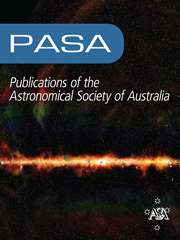Crossref Citations
This article has been cited by the following publications. This list is generated based on data provided by
Crossref.
Bailey, Janelle M.
and
Slater, Timothy F.
2003.
A Review of Astronomy Education Research.
Astronomy Education Review,
Vol. 2,
Issue. 2,
p.
20.
McKinnon, David H.
2005.
Distance/Internet Astronomy Education.
Highlights of Astronomy,
Vol. 13,
Issue. ,
p.
1037.
Broadfoot, John M.
and
Ginns, Ian S.
2005.
Astronomy Education Research Down Under.
Highlights of Astronomy,
Vol. 13,
Issue. ,
p.
1024.
Danaia, Lena
and
McKinnon, David H.
2007.
Common Alternative Astronomical Conceptions Encountered in Junior Secondary Science Classes: Why Is This So?.
Astronomy Education Review,
Vol. 6,
Issue. 2,
p.
32.
Wilhelm, Jennifer
2009.
A Case Study of Three Childrens' Original Interpretations of the Moon's Changing Appearance.
School Science and Mathematics,
Vol. 109,
Issue. 5,
p.
258.
Küçüközer, Hüseyin
Korkusuz, M. Emin
Küçüközer, H. Asuman
and
Yürümezoğlu, Kemal
2009.
The Effect of 3D Computer Modeling and Observation-Based Instruction on the Conceptual Change Regarding Basic Concepts of Astronomy in Elementary School Students.
Astronomy Education Review,
Vol. 8,
Issue. 1,
Lelliott, Anthony
and
Rollnick, Marissa
2010.
Big Ideas: A review of astronomy education research 1974–2008.
International Journal of Science Education,
Vol. 32,
Issue. 13,
p.
1771.
Saçkes, Mesut
Flevares, Lucia M.
and
Trundle, Kathy Cabe
2010.
Four- to six-year-old children's conceptions of the mechanism of rainfall.
Early Childhood Research Quarterly,
Vol. 25,
Issue. 4,
p.
536.
Sun, Koun-Tem
Lin, Ching-Ling
and
Wang, Sheng-Min
2010.
A 3-D VIRTUAL REALITY MODEL OF THE SUN AND THE MOON FOR E-LEARNING AT ELEMENTARY SCHOOLS.
International Journal of Science and Mathematics Education,
Vol. 8,
Issue. 4,
p.
689.
Cabe Trundle, Kathy
Atwood, Ronald K.
Christopher, John E.
and
Sackes, Mesut
2010.
The Effect of Guided Inquiry-Based Instruction on Middle School Students’ Understanding of Lunar Concepts.
Research in Science Education,
Vol. 40,
Issue. 3,
p.
451.
Yu, Ka Chun
Sahami, Kamran
and
Denn, Grant
2010.
Student Ideas about Kepler’s Laws and Planetary Orbital Motions.
Astronomy Education Review,
Vol. 9,
Issue. 1,
Sneider, Cary
Bar, Varda
and
Kavanagh, Claudine
2011.
Learning about Seasons: A Guide for Teachers and Curriculum Developers.
Astronomy Education Review,
Vol. 10,
Issue. 1,
p.
010103.
Sarıoğlan, Ayberk Bostan
and
Küçüközer, Hüseyin
2014.
In-service Science Teachers’ Ideas about the Phases of the Moon and Brightest Star.
Procedia - Social and Behavioral Sciences,
Vol. 116,
Issue. ,
p.
250.
Van Der Steen, Steffie
Steenbeek, Henderien
Van Dijk, Marijn
and
Van Geert, Paul
2014.
A process approach to children's understanding of scientific concepts: A longitudinal case study.
Learning and Individual Differences,
Vol. 30,
Issue. ,
p.
84.
Testa, Italo
Galano, Silvia
Leccia, Silvio
and
Puddu, Emanuella
2015.
Development and validation of a learning progression for change of seasons, solar and lunar eclipses, and moon phases.
Physical Review Special Topics - Physics Education Research,
Vol. 11,
Issue. 2,
Lee, Hyunju
and
Schneider, Stephen E.
2015.
Using astronomical photographs to investigate misconceptions about galaxies and spectra: Question development for clicker use.
Physical Review Special Topics - Physics Education Research,
Vol. 11,
Issue. 2,
Lee, Hyunju
and
Feldman, Allan
2015.
Photographs and Classroom Response Systems in Middle School Astronomy Classes.
Journal of Science Education and Technology,
Vol. 24,
Issue. 4,
p.
496.
Saçkes, Mesut
2015.
Research in Early Childhood Science Education.
p.
35.
Wilhelm, Jennifer
Cameron, Shelby
Cole, Merryn
and
Pardee, Rachel
2015.
Using Professional Noticing to Address Middle Level Students' Alternative Conceptions of Lunar Phases.
Science Scope,
Vol. 39,
Issue. 1,
p.
32.
Lee, Jeong-A
Lee, Kiyoung
Park, Young-Shin
Maeng, Seungho
and
Oh, Hyunseok
2015.
A Case Study on Spatial Thinking Revealed in Elementary School Science Class on Solar System and Stars.
Journal of The Korean Association For Science Education,
Vol. 35,
Issue. 2,
p.
179.


